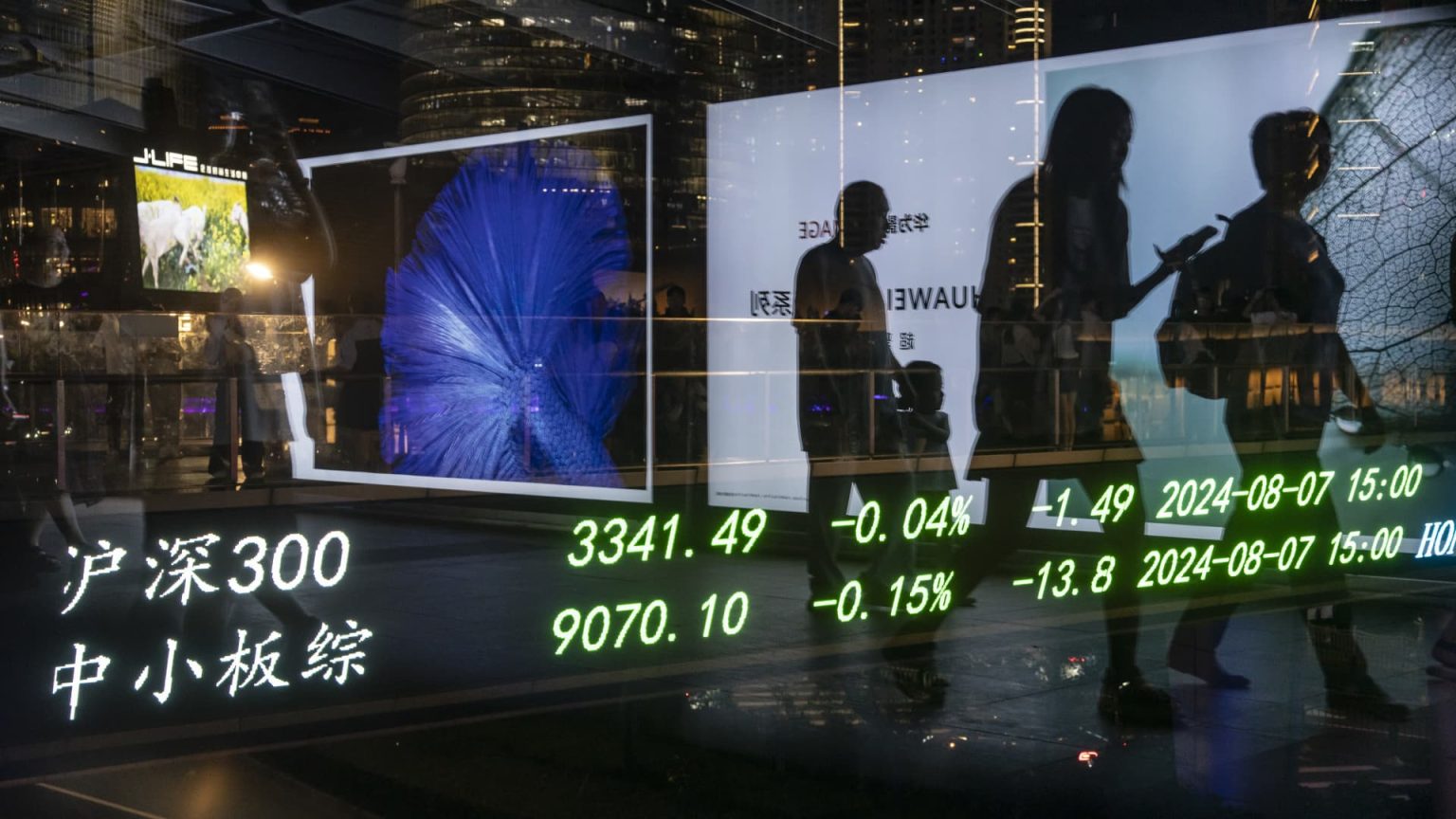The latest global market volatility has reinforced China’s status as a distinct market, even if its growth has slowed recently. While U.S. tech stocks plunged and Japanese stocks swung wildly in a historic two days of price action , Chinese stocks suffered less . As of the end of the Asia trading week Friday, before the U.S. market open, the Nasdaq 100 and Nikkei 225 were both down by about 2.5% over the last five trading days, according to Wind Information. In contrast, the Shanghai composite was down by 1.5% and the MSCI China index was up by 0.2%. Hong Kong’s Hang Seng Index was up by 0.9%. “If we continue [to have] volatile markets in the US and other developed markets, people are going to look elsewhere to generate returns,” Matt Wacher, chief investment officer, Asia-Pacific, for Morningstar Investment Management, said in a phone interview Friday. “We think the fundamentals will win out in the end and capital will come back to some of the companies in China because they’re too compelling an investment opportunity to pass up,” he said. Fund flow data from EPFR showed that international investors significantly increased their purchases of Chinese stocks on Monday, Aug. 5, before trimming holdings the next day. The investors remained net buyers of Chinese stocks for the third quarter so far as of Aug. 6, the data showed. “We believe that there are reasons for international investors to look towards redeploying some allocation back to the China equity market after being relatively lightly positioned,” William Yuen, investment director, Invesco, said in an emailed statement Friday. “Valuations of Chinese equities are near historical lows and the stock market is broad and deep enough to enable investors to search for growth opportunities,” he said. “The economy has also shown signs of stabilizing, as policy easing measures take effect. Finally, the low correlation of the China stock market with the U.S. stock market could provide investors with diversification benefits.” Chinese stocks, especially those traded on the mainland, have historically been less correlated to global market moves due to Beijing’s capital controls and other restrictions. International investors without operations in China have gradually been able to access some of those mainland stocks, called A shares, via stock-connect programs through Hong Kong. However, this year ”foreign long-only funds and hedge funds have been actively selling” A shares, HSBC analysts pointed out in an Aug. 6 report. That’s left net inflows from both fund types at 13 billion yuan ($1.81 billion) for the year through Aug. 2, the report said. On the flip side, semiconductor company Montage Technology and state-owned train company CRRC — both listed in Shanghai — led net inflows during that time, according to HSBC. Both stocks have fallen over the last five trading days. The latest global market volatility was spurred in part by the unwinding of the Japanese yen carry trade, after the Bank of Japan’s rate hike and growing expectations for U.S. rate cuts. A carry trade is a practice in which investors borrow money in a currency from a country with low interest rates, and invest in currencies with higher yields. The investors then profit from the difference in rates, but can lose money if this suddenly changes. A worrying U.S. jobs report on Aug. 2 helped fuel expectations that the Federal Reserve will soon finally cut interest rates, shifting assumptions about how much certain assets might yield in returns versus others. It hasn’t been hard for investors to choose where to put most of their money when the 10-year Treasury yield has traded above 4% — versus 2.17% for the Chinese equivalent. HSBC’s multi-asset team expects a stock market sell-off from unwinding the Japanese yen carry trade could last one month. If the Fed does cut rates, that could support the case for Chinese stocks, Steven Sun, head of research, HSBC Qianhai Securities, and a team said in the Aug. 6 report. U.S. rate cuts would mean the People’s Bank of China could then further ease its monetary policy, “which is critical for China’s nascent property market recovery,” the analysts said. They added that a weaker U.S. dollar makes the Chinese yuan more attractive to foreign inflows, while U.S. rate cuts are generally positive for emerging markets such as China. China’s latest trade and inflation data released in the last several days indicated that domestic demand is holding up, although the economy isn’t necessarily firing on all cylinders. The National Bureau of Statistics is scheduled to release additional data for July on Thursday, of which retail sales will be key to watch after it grew by just 2% in June. However, global institutions’ caution on Chinese stocks won’t likely change quickly. “Investors should still prefer the US to Chinese financial markets,” Paul Christopher, head of global investment strategy at Wells Fargo Investment Institute, said in an email. “Times of economic stress typically favor US markets, even when the US is the source of stress. We believe that’s because the US economy is more diverse than those that are export-oriented (as China’s still is).” “The real problem with China’s investment outlook isn’t the current market volatility, but the Chinese economy’s ongoing weakness and the disappointing policy response so far,” he said. “Deflation is the central problem.” He noted that last month’s ” Third Plenum ” meeting focused on “resilience to external shocks” instead of a range of domestic problems. Chinese stocks have struggled to rebound amid dour sentiment about the massive property market and other economic challenges since the Covid-19 pandemic. Hong Kong’s Hang Seng Index is clinging to gains for the year so far — after a record losing streak of four down years. “I think what you saw over the last few days has been that some of those names, Alibaba , Tencent , have held up pretty well in the face of that global volatility,” Morningstar’s Wacher said. “I think that’s because they’re already priced pretty reasonably from a valuation perspective, not much more to fall.” Tencent, the largest stock by market capitalization in the Hang Seng Index, and Alibaba’s Hong Kong-listed shares both closed Friday with gains of more than 3% for the week. “In Alibaba’s case, it’s still got a very good management team, similar to Tencent,” Wacher said, pointing to efforts aligned with investors’ interests in balance sheets and cutting costs. “We think that their inwardly focused on China consumption, and China consumption will turn around,” he said. “They’re going to generate most of their income within China, less susceptible to trade wars and shenanigans that go on in the global economy. Compelling opportunities from that perspective.”
Read the full article here













